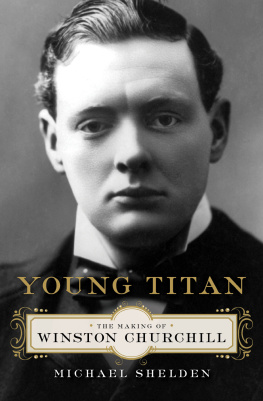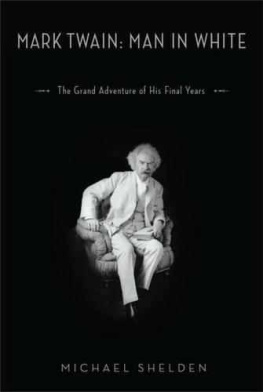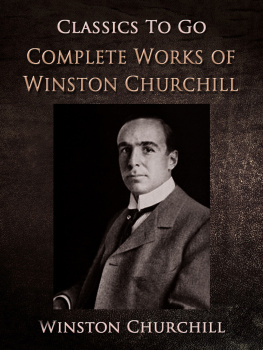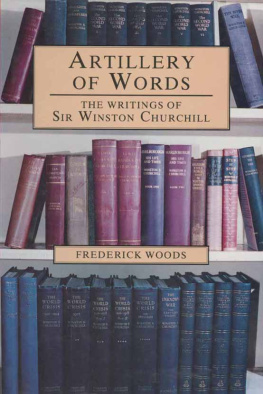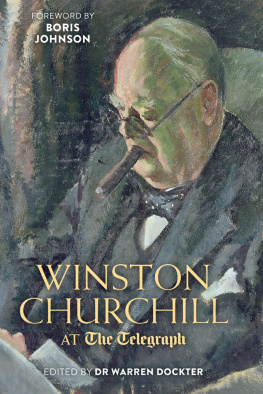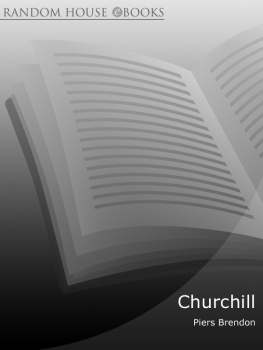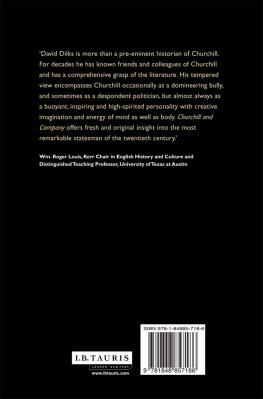CONTENTS
To my daughters, Sarah and Vanessa
The force of character is cumulative.
R ALPH W ALDO E MERSON
PRELUDE:
T HE P RIME M INISTER
N ear midnight on a Saturday in May 1941 a great wave of planes appeared over London, their silhouettes against a moonlit sky. As they roared past Westminster Bridge, whole streets were set ablaze, fires broke out at Westminster Abbey, and shrapnel pounded the tower of Big Ben. Soon flames were sweeping through the debating chamber of the House of Commons. Its roof fell away, the galleries collapsed, and a shower of twisted steel and masonry buried the rows of green leather benches where so many famous debates had raged over the decades. Only the scorched walls were left standing.
The next afternoon, while parts of London were still burning and the smell of smoke was everywhere, Winston Churchill came to Parliament to inspect the damage. This was the second spring of Adolf Hitlers war against Great Britain, and Churchill was just completing his first year as prime minister. To everyones surprise, the clock towerthough blackened and pockmarkedwithstood the raid, and Big Ben was continuing to strike the hours. Because the attack had come late at night, only a few people had been in the building, and the death toll was limited to three, including two policemen. Over the whole of London, however, the casualty rate was appalling, with more than three thousand killed or injured. It would prove to be the worst night of the Blitz.
As he poked through the rubble, Churchill paused beside some charred beams and cast a solemn gaze over the destruction. With its roof gone, the wrecked chamber was illuminated by a pale shaft of sunlight, and the air was thick with dust. There were no relics to salvage, nothing new to learn about the enemys methods. At one level this was simply the latest in a long list of venerable buildings to suffer the fury of
The loss was personal. The prime minister had spent much of his life in this chamber, beginning with his appearance on its floor as a new member forty years earlier, when he was a slender young man with fine, reddish hair, sharp blue eyes, and a boys freckled face. Here, as he would say, I learnt my craft. On this ground his fatherLord Randolph Churchillhad stood as an ally of Disraeli and an adversary of Gladstone. In the Ladies Gallery his American-born motherthe indomitable Jenniehad watched proudly as her son gave his maiden speech. He had sparred with friends and enemies herefrom the early days of the century when he matched wits with the political powerhouse Joseph Chamberlain, to more recent times when he challenged the judgment of Joes younger son, Neville, who so badly misjudged Hitler in the 1930s.
Here he had enjoyed moments of triumph and endured defeats; given brilliant speeches and, occasionally, a dull one; earned the admiration of many; and enraged not a few. On one memorable occasion early in his career an opponent had jumped up during a raucous debate, grabbed the Speakers bound volume of the rules of the House and thrown it at him, hitting him in the face and drawing blood. During the abdication crisis of 1936, when he had tried to offer words of support for Edward VIII, howls of protest had filled the chamber, silencing him and causing some to predict that his political career was at an end.
Just three days before Hitlers planes dropped their bombs on this spot, Churchills old friend and rival from the early yearsDavid Lloyd Georgehad risen in the debates to paint a bleak picture of the progress of the war, complaining of discouraging setbacks. In what was to be his last speech in the old chamber Churchill responded to Lloyd Georges pessimism with an impassioned declaration of his faith in the war effort. I feel sure we have no need to fear the tempest, he said on Wednesday, May 7. Let it roar, and let it rage. We shall come through.
Little did anyone suspect that the tempest would soon roar and rage in the very place where he spoke.
Now, as he surveyed the damage of that fiery Saturday night, tears began to trickle down his cheeks, and then to flow. He did not try to stop them, noted a reporter standing nearby, or even wipe them away. Motionless in the sunlightone hand in his overcoat, his feet planted firmly on a mound of rubblehe looked for a second like a statue that had miraculously survived the bombing.
The next moment, however, he pulled himself together and declared decisively, The Chamber must be rebuiltjust as it was.
Then he turned and walked carefully back to his waiting car. A crowd had gathered outside, where debris from the bombing was spread in all directions, with burned bits of paper blowing in gutters. In the background could be heard what an observer later called one of the most horrible sounds of the warthe tinkle of glass being swept up. Yet Churchill showed no sign of indecision or gloom. He waved confidently and a rousing cry greeted him.
History likes winners, and the image of the older, victorious Churchill has long overshadowed the story of the eager younger man who soared to prominence only to find he had overreached, and who left office with his reputation in tatters. Yet in many ways the early period is the most colorful of his career and the key to his character. It was an exhilarating time full of high drama, political intrigue, personal courage, and grave miscalculations.
Churchill thought his chance for greatness on a grand scale would come early in life, and for such a restless, ambitious man the long wait was difficult to bear. By the time he became prime minister at sixty-five, he was more than ready for the job and was able to offer the world much of what it expects from its heroesexcept the excitement and glamour of youth.
No doubt the great man weeping among the ruins of his parliamentary past was a better leader because he had spent a lifetime preparing for his part. But there was a period in his twenties and thirtiesin the distant Edwardian pastwhen success had beckoned on the world stage, and when the vigor of a more dashing, youthful character was at his command. The adventures and ordeals of those early years were essential to the making of the man who triumphed in the Second World War. Young Winstons career began with dreams of success that fueled a spectacular political rise, but which ended in dramatic failures, creating an equally spectacular fall. At forty he was largely written off as a man whose best days were behind him.
As Churchill confessed in old age, he had felt so misunderstood in those younger days that he thought he had become in the eyes of many a freakalways thatbut much hated & ruled out. Redeeming the promise of his youth became the great challenge of his later life.
INTRODUCTION:
T HE Y OUNG T ITAN
W inston Churchill didnt stumble into greatness. In a conscious and methodical way, he set out as a young man to become the hero that he believed his era of great events demanded. He fashioned his career as a grand experiment to prove that he could work his will on his times, persevering in that approach despite repeated setbacks and the often harsh ridicule of those who didnt share his high opinion of himself. Many of his contemporaries accepted that history is the Biography of great men, as the Victorian sage Thomas Carlyle put it, but whether Churchill belonged among the great was always a subject of hot debate, andfor someit still is. He had few doubts about his destiny, however, and raced to establish himself as the most dynamic and imaginative politician in the British Empire.
At the heart of his story is an irrepressible spirit whose tough character was shaped in part by a romantic temperament that flowered in his youth and never entirely disappeared. It arose from a powerful concept of personal will that Churchill embraced early in adulthood. I believe in personality, he declared in one of his earliest political speeches, confidently endorsing the notion that the heroics of great leadersnot vast movements or impersonal systemsshape history. We live in an age of great events and little men, he said, and if we are not to become the slaves of our own system... it will only be by the bold efforts of originality, by repeated experiment, and by the dispassionate consideration of the results of sustained and unflinching thought.

